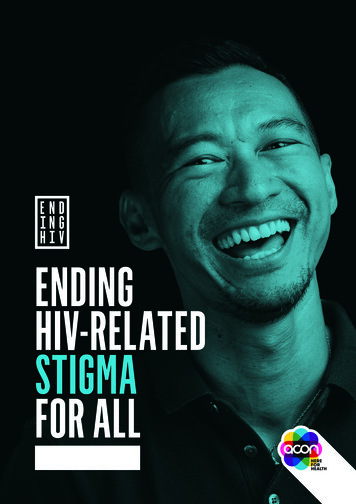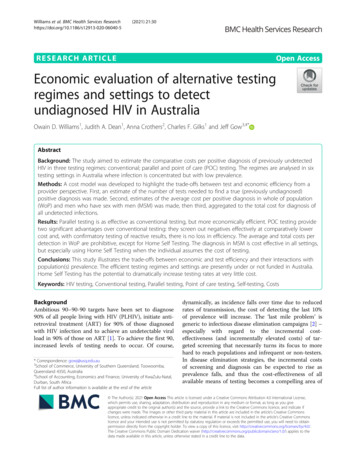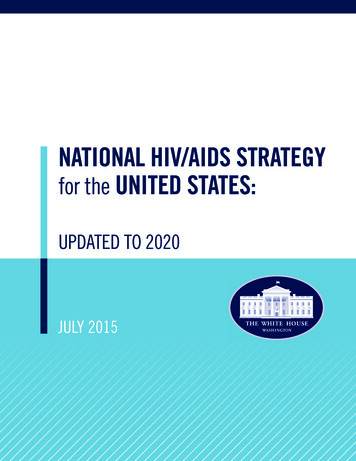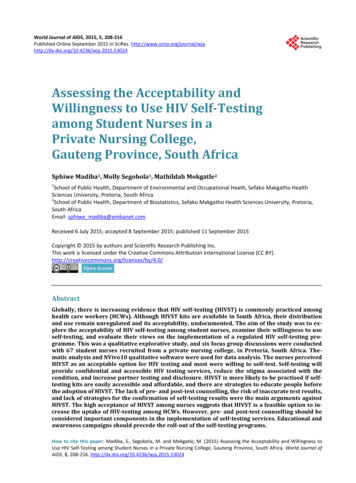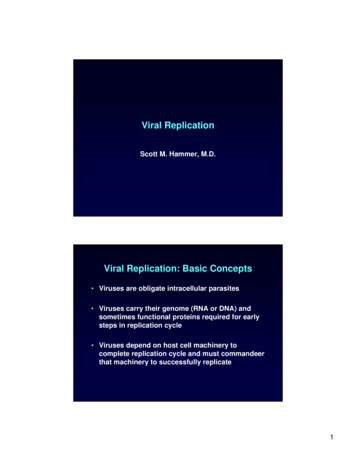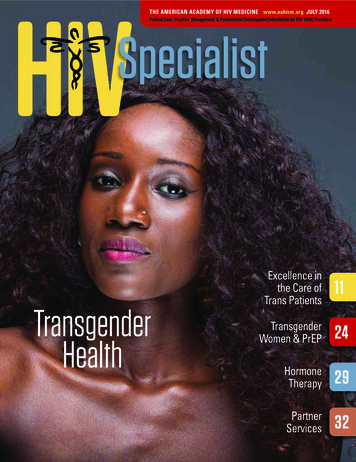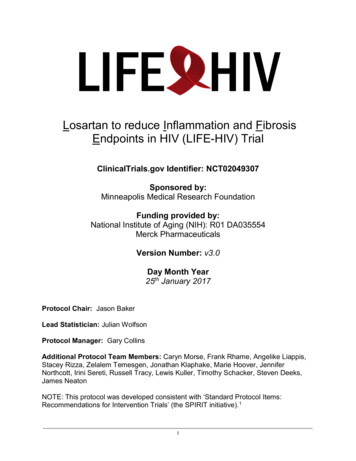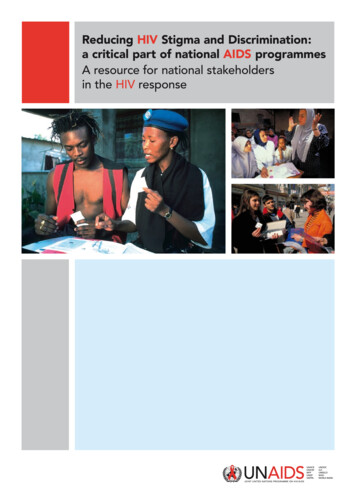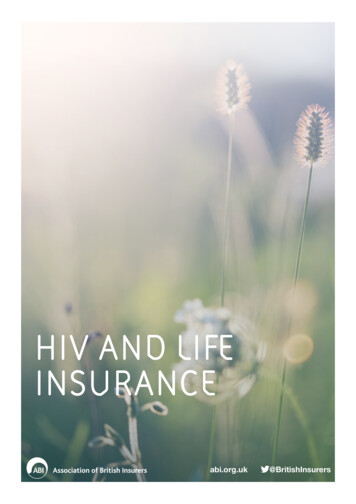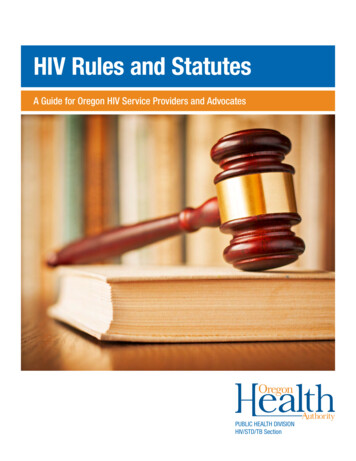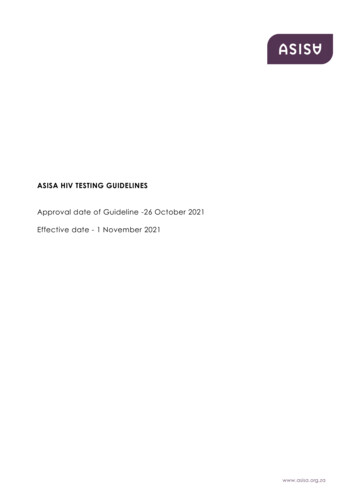
Transcription
ASISA HIV TESTING GUIDELINESApproval date of Guideline -26 October 2021Effective date - 1 November 2021www.asisa.org.za
INDEXThese guidelines are made up of seven sections namely:ABCDEFGIntroductionGoals of the guidelinesGeneric PrinciplesPre-test proceduresTesting proceduresReporting resultsPost-test proceduresAnnexures:1.2.3.4.5.6.7.8.9.ASISA HIV Testing Information SheetList of ASISA approved laboratoriesList of ASISA approved test kitsAlgorithm – 4th generation testingSample letter to nominated healthcare provider: application acceptedSample letter to the client: application declinedLetter to nominated party for post-test counsellingNote to nominated healthcare provider: Interpretation of HIV test resultsPCR test result positive on HIV vaccine recipient: Letter to nominated party forpost-test counsellingwww.asisa.org.za2
SECTION A-INTRODUCTIONThe purpose of the HIV Testing best practice guideline is to ensure that the life industryfollows the highest standards in all aspects of HIV screening of applicants for life insurance.This guideline applies to all HIV tests performed by ASISA members. It addresses issues suchas identification, confidentiality, informed consent, pre- and post-test counselling,transmission of test results and approval of test kits and laboratories.SECTION B: GOALS OF THE BEST PRACTICE GUIDELINETo minimise false-reactive results and the resultant emotional trauma to the client.To this end, the tests utilised must meet the specified sensitivity and specificity levels.The restriction of false negative results to an absolute minimum.The mandatory identification of the person whose sample has been taken.Maintenance of confidentiality of results.To make it clear that the insurance industry is only involved in screening for HIV in order toassist in the risk assessment of an applicant.To ensure that proper steps are taken to identify and treat participants in vaccine trialsappropriately.SECTION C: GENERIC PRINCIPLESAll HIV tests used for insurance purposes should meet all of the following generic criteria:a. THE PROCESS1.IdentificationTo be done according to these guidelines.2.Pre-test counsellingClients to be offered the ASISA HIV information document.3.Informed ConsentClients to sign voluntary informed consent as specified in the guidelines.4.Nomination of party to receive resultClients to nominate a party as recommended by the guidelines to receive reactiveresults.5.Sample collectionSample collection should be done only by persons recommended by theguidelines for such purposes.All samples must be identifiable as the specific client’s sample after collection.www.asisa.org.za3
If a blood specimen is to be sent to the laboratory, the sample should besufficient to allow for second and third line testing in cases of reactive first linetests.Blood specimens must be suitable for storage for the minimum prescribed periodas per the guidelines (reasons include possible re-testing in cases of dispute,fraud, etc).6. Transport of samplesSamples should be transported in a manner as required by the manufacturer of thetest in question.7. Laboratory testing facilities.7.1 In-house testing by ASISA membersEach member is liable for its own quality control measures.7.2 External laboratoriesAll HIV testing laboratory facilities need to be approved by ASISA to ensureconsistency in testing methods, administration requirements and accuracyof results.All aspects of the testing methodology and processes followed, includingfor e.g. sample collection, chain of custody, sample receipt, testingmethodology, result interpretation and result delivery must be done asspecified in these guidelines.8.Interpretation of test resultsThe interpretation of the test results by life offices should be done according to theguidelines, however the underwriting of each test result should be done according toeach insurers' own underwriting guidelines.9.Communication of resultsOnly the nominated person authorised by the client to receive the reactive result,must communicate with the client, and do the post-test counselling.b.TEST SPECIFICATIONSAny HIV test not listed in the relevant annexure as an approved test will be consideredby MUSC, according to the following guideline:Irrespective of the type of test used, any test must conform to the following minimumcriteria:1. Test sensitivity: 99%2. Test specificity: 99%www.asisa.org.za4
All testing methods will be submitted to an expert consultant for validation.SECTION D: PRE-TEST PROCEDURESThe following principles in terms of identification, counselling options, informed consent, nominationof party to receive results, sample collection and transport of samples should be adhered toirrespective of the test methodology followed.1.Identification1.1When an HIV test is requested, the sales intermediary should inform the client that anoriginal identity document as specified below, will be required when the samplespecimen is collected, and that he/she will be required to nominate a healthcareprovider to receive the HIV test result.1.2The following identity documents are acceptable:1.2.11.2.22.Valid original South African identity document or passport, issued by theDepartment of Home AffairsValid official South African Card-type driver’s license.1.3Temporary ID documents should be dealt with at the discretion of each member.1.4Foreign passports should be dealt with at the discretion of each member.1.5Copies of identity documents are not advised, regardless of whether such documentsare certified or not.1.6Where there is a discrepancy between the name on an identity document and thename on the pathology request form (such as where the client now uses a marriedname but his/her identity book has not been reissued) and the client is identifiable asthe applicant in issue, this discrepancy has to be noted on the form and reported to theinsurer together with the test result.1.7Refugee documents should be dealt with at the discretion of each member.Counselling options2.1Every client should be offered pre-test counselling by reading a copy of the HIV testinginformation sheet.2.2The HIV testing information sheet is attached as Annexure 1. The wording of this HIVtesting information sheet should not be altered, except in consultation with the ASISAMedical and Underwriting Standing Committee.2.3Ideally the client should receive this sheet from the sales intermediary but, failing this, itmust be provided by the person collecting the specimen. Member offices must ensurethat this documentation (either paper or electronic versions) is made available to thoseparties collecting specimens, and sales intermediaries.www.asisa.org.za5
2.43.Post-test counselling services can be done through the client’s nominated healthcareprovider.Informed consentEach client must sign voluntary informed consent to undergo a HIV test, see Annexure 1B.If the client is not prepared to sign the consent, the sample should not be collected.4.The nomination of a party to receive the resultEach client must nominate a party to receive reactive results. These parties must at leastbe able to:Receive, handle and store the results confidentially.Do adequate post-test counselling.Arrange for confirmatory testing.Institute treatment when indicated or refer the client to an appropriate facility forthis purpose.These parties may be one of the following:Family practitioner.Independent Medical practitioner.Other healthcare provider.5. Sample collectionSample collection should be done only by persons approved by the guidelines for suchpurposes: Medical practitionersQualified nursing sistersStaff nursesRegistered phlebotomistsAll venesection samples must be identifiable as the specific client’s sample aftercollection, containing at least the clients' initials and surname.It is recommended that for finger prick testing photographic identification is captured.The venesection sample should be sufficient to allow for second and third line testing incases of reactive first line tests.The sample must be suitable for storage for the minimum period to allow for retesting. Reasons include for example cases of dispute, or fraud.The minimum storage period in cases of reactive results is 6 months.The minimum storage period in cases of non-reactive results is 2 weeks.HIV Testing should be done on whole blood sample obtained by venesection or fingerprick.In terms of the guidelines the following types of samples are advised for insurance HIVtesting:www.asisa.org.za6
Whole blood samples:For venesection, one tube of clotted blood must be collected from all applicants forpurposes of testing for HIV by the methodologies as described later. If any additionalnon-HIV pathology tests are required, additional tubes of blood should be collectedin the appropriate tubes for this purpose, as the HIV tests are done on dedicated lineswithin laboratories.It is important that one tube of EDTA (purple capped tube) blood also be collectedfrom applicants who are/have been participants in an HIV vaccine trial. This EDTAsample is required for a Polymerase Chain Reaction Test (PCR) in cases where theElisa (serology) Immuno-Assay test is reactive in persons who have received avaccineFinger prick sampling:Finger prick sampling is allowed for first line screening testing. If this test result is nonreactive no further testing is required and the result is documented for underwritingpurposes. Any other test result will require a venesection sample for laboratorytesting. It is recommended that a clotted blood sample and an EDTA tube aresubmitted. The laboratory will follow the normal procedure as set out in section E1 asif no prior testing was performed.Oral fluid samples:These are not recommended in terms of the minimum sample criteria, as they cannotbe stored for the specified period, and do not meet the minimum sensitivity andspecificity criteria.6. Transport of venesection samples Samples must be packaged individually with the relevant documentation toensure that the chain of custody is maintained.Samples should be transported in such a manner to meet the requirements of themanufacturer of the test kitSECTION E: TESTING PROCEDURESSECTION E1: LABORATORY TESTING1.Approval of laboratoriesAll laboratories must be approved by ASISA to perform HIV tests for insurance purposes interms of the HIV Testing Guideline. Any decisions with regard to approval shall be made onthe basis of the approval guidelines set by ASISA from time to time.All applications for approval should be directed to the ASISA office. The list of approvedpathology laboratories is in Annexure 2.www.asisa.org.za7
Different types of HIV testing kits used are approved by ASISA. Laboratories may only useHIV tests listed in Annexure 3 for insurance HIV testing.2.3.Laboratory receipt of specimens:2.1If no documentation is received with the blood specimen by the laboratory, thelaboratory shall refuse to perform the HIV test.2.2If the blood specimen and documentation are received from any source otherthan those persons approved in Section A5, the laboratory shall refuse to conductthe HIV test and discard the blood specimen.2.3If the laboratory does the HIV test in the absence of the required documentation,the member office shall ignore the result and no fee will be payable. A further testwill be required, conducted in terms of the Guidelines.MethodologyAn ASISA approved laboratory may only use the 4th Generation Combi HIV testingprotocol for insurance HIV screening.This protocol uses one of the ASISA approved 4th Generation Combination HIV tests (Combitest) as a first screening test.The first Combi screening test analysis system should identify a specimen by its bar code andmust test the sample using the primary tube. All pipetting procedures should be fullyautomated for the first Combi screening test.Primary tube sampling and automated test procedures are recommended, but notmandatory, for the second and third tests.Low-reactive values for all ASISA approved 4th generation Combi tests, will be defined fromtime to time by MUSC with expert opinion. Reactive results below these cut-off levels will bereported as low-reactive.Please see Annexure 3 for the approved first line 4th Generation Combi tests.Low-reactive values on the Combi tests will be reported according to the following table:Test1.1 Elecsys RocheHIV Combi PT4th generation test1.2 ArchitectCombo1.3 Axsym Combo1.4 Vidas HIV Duowww.asisa.org.zaSupplierReference rangeRoche 0.90 Non-reactive0.90 – 1.1 Greyzone 1.1 Reactive 1.00 Non-reactive 1.00 Reactive 0.90 Non-Reactive0.90 – 0.99 Greyzone 1.00 Reactive 0.25 NegativeAbbottAbbottOmnimed“Low Reactivevalue”0.9-101-100.9-100.25-3.08
(HIV6)1.5 Bio-Rad HIVCombi(DxI/Access)1.6 Centaur CHIVCombo1.7Abbott Alinity iHIV Ag/AB Combo1.8 Diasorin LiaisonHIV Ab/AgBio-RadSiemensAbbott 0.25 - 0.35 Borderline 0.35 Positive 0.9 Non-Reactive0.9 - 1.0 Gray-zone1.0 and 1.0 Reactive0 to 0.29 Non-reactive0.30 to 0.99 Grey zone 1.00 Reactive 1.00 Non-reactive 1.00 Reactive 1.00 Non-reactive 1.00 Reactive0.9 - 101 - 101-201. Antibody 1-30 andantigen non-reactive.2. Antigen 1-30 andantibody non-reactive.3. Antibody 1-30 andantigen 1-30.Equivocal results are not accommodated in the ASISA Guidelines.4.HIV vaccine trial participantsWhere a client has indicated that he/she is/was a participant in an HIV vaccine trial, andhis/her unique trial identity number has been supplied, the laboratory should do a PCR teston any case yielding a reactive Elisa (serology) result, irrespective of whether one, two orthree results are reactive. An EDTA sample of blood would have been provided for thispurpose in these cases.SECTION F: REPORTING RESULTSFinger prick testing results: if the result is non-reactive the client is regarded as HIVnegative. The client may be informed if they request the result. Any other result is regardedas indeterminate and would be followed up by a venesection sample sent to thelaboratory. This sample will be regarded as a first test sample by the laboratory. It must beemphasized that this is a screening test only and no client can be regarded as HIV positiveuntil confirmatory testing has been done. Follow Annexure 4 algorithm.1.Format of laboratory results:The results of the first line 4th Generation HIV Combi test will be reported as either nonreactive, low reactive or reactive. The cut-off values for a low-reactive result will be decidedupon from time to time by MUSC in consultation with an expert.For the purposes of this document molecular testing means acceptable molecular testingas per SANAS accreditation.www.asisa.org.za9
2.Reporting results from laboratory to insurer:Member offices are responsible for ensuring confidentiality in their offices. The preferredmethod for reporting all results is via electronic means. All results should be sent confidentiallyto the insurer; reactive results must be sent to the designated contact person in the insurerassigned to dealing with HIV reactive results.SECTION G: POST-TEST PROCEDURES AT THE LIFE OFFICEHandling of results, communicating with the client and post-test counselling:1.4th Generation Combi ProtocolSee Annexure 4.Test procedures on HIV Vaccine trial participantsA person who has received an HIV vaccine may also develop antibodies in response to thisvaccine. It is expected that a significant number of healthy individuals who will receive the vaccine,will develop sufficient antibodies to render the Elisa (serology) HIV test positive (reactive). Theimplications of this are that:The person has not contracted AIDS/HIVThe test is actually false positive (reactive) due to the vaccineAs a person who has participated in an HIV vaccine trial can apply for insurance many years afterhaving received the vaccine, it is theoretically possible that he/she may have become infectedwith the HIV virus after having the received the vaccine. A reactive HIV Elisa (serology) test will notbe able to distinguish between these possibilities.For this reason, all reactive first line HIV tests in HIV vaccine trial participants, must undergoa qualitative PCR as the second line test.Interpretation of the PCR tests results in these cases should be as follows:a)A reactive HIV Combo test and negative PCR tests indicate that:The combo test is reactive due to the vaccineThe client has not been infected by HIV.In these cases, no correspondence is necessary to the client or his/her nominated healthcareprovider.b)If the PCR test is positive (reactive), indications are that the client has been infectedwith HIV, in addition to receiving the vaccine.The same procedure as for reactive tests will then be followed.www.asisa.org.za10
ASISA HIV TESTING INFORMATION SHEETAnnexure 1AIF YOU HAVE ANY PROBLEM UNDERSTANDING THIS DOCUMENT, ASK THE NURSE OROTHER HEALTHCARE PROVIDER TO EXPLAIN IT TO YOU.WHAT ARE MY RIGHTS?You have the following rights:1.Not to be tested for HIV without your free and informed consent.2.To be given all relevant information on the harms, risks and benefits of taking, or nottaking, the HIV test.3.To refuse to take the test. If you do this, your application for insurance may be denied, ifthe insurer requires an HIV test as part of their risk assessment.You may however wish to consider an alternative product and it is suggested that youconsult with a financial advisor.4.To receive pre-test counselling which is private and confidential, and which will inform youmore about the test and its implications before you give consent. This information sheetprovides you with the necessary information to constitute pre-test counselling.To nominate a healthcare provider to receive reactive results,5. To have your test result treated confidentially. An abnormal test result will be made availableto your nominated healthcare provider and this test result may also be stored on a centraldatabase in an encoded form. This information can only be accessed by other insurancecompanies with your consent. You also have the right to access this information to checkthat it is correct.6. To one session of post-test counselling if the test is reactive, at the expense of the Lifecompany involved.WHY DO LIFE INSURANCE COMPANIES TEST FOR HIV?Underwriting is the basis of assurance to ensure that each applicant pays a premium appropriateto the risk. The insurance company requires information from the applicant to help it assess the riskof granting the insurance and to establish an appropriate premium. Insurance companies screenapplicants for serious diseases or habits that may affect their state of health. This may be donethrough questionnaires, medical examinations and other tests including a test for HIV.IS THE TEST ALWAYS CORRECT?Even though the tests are very accurate, they must be regarded as screening tests only and notdiagnostic. If a test result is reactive, further testing must be done to confirm the status.As with any biological test, a false positive result may occur in a small number of cases, i.e. the testshows a reaction when the person is not infected with the virus. No party can be held responsiblefor false positive results including the laboratory, or the insurance company. The true HIV status ofthe person can be ascertained by doing further tests. The insurance companies and laboratorieswww.asisa.org.za11
follow strict procedures to eliminate potential inaccurate results. To minimize false positive resultsbeing communicated to the client, further testing must be performed on all initial reactive tests.However, all tests done by the insurance company must be regarded as screening tests and furthertesting must be performed by the client.WHAT DOES IT MEAN IF THE TEST IS NON-REACTIVE?If your test result is non-reactive, it means that you are either not infected, or the disease is in tooearly stage for the test to detect its presence (window period). There is a period of one to six weeksafter the infection before an HIV test will be positive.WHAT DOES IT MEAN IF THE TEST IS REACTIVE?If your test result is reactive, it is regarded as an inconclusive result meaning either that you may beinfected with HIV or this is a false positive result. If this testing indicates you are HIV positive, you willbe notified about the outcome of your policy application by the company involved. In order toconfirm your inconclusive status, further testing must be done. If it is shown that there was a falsepositive result, the company may reconsider a further application for insurance. For new applicantswho are HIV positive insurance products are available. This should be discussed with your financialadvisor. All your existing cover will remain valid.NOTIFICATION OF RESULTSIf your test result is negative:Your application will be assessed, and the outcome communicated to you.If your test is reactive:A trained person should discuss the information with you so that you can understand clearly whatthe test result means.Consequently, it is of the utmost importance that you think carefully about the healthcare providerwho should receive the results. You will be advised to contact this person.Please note that if you receive a letter to contact the nominated healthcare provider, this does notautomatically mean that the HIV test result is positive. The healthcare provider will be fully informedand will inform you accordingly.FOR ANY GENERAL QUERIES REGARDING HIV, CALL THE AIDS HELP LINE: 0800-012-322.www.asisa.org.za12
HIV INSURANCE TESTING CONSENT FORM -Annexure 1BINFORMED CONSENT TO HIV TESTING TO BE COMPLETED BY APPLICANTI understand the information contained in the ASISA HIV testing information sheet.I freely consent to the collection of my blood sample, whether by finger prick and/orvenesection, for the purposes of HIV testing.I freely consent to the testing of those samples.I understand that the results of my tests will be kept confidential, except for the disclosureof any reactive result to the healthcare provider, that I have named below.I have read the information on this form about what a test result means.I understand that I should contact my nominated healthcare provider, for furtherinformation and counselling if required.I understand that your Life Company will pay for one session of post-test counsellingwith a healthcare provider of my choice, if I desire it, and if the test result is reactive.I understand that I have the right to request and receive a copy of this form.I understand that details of a reactive test result will be held confidentially on a centralregister.I hereby confirm that all my questions and queries were answered satisfactorily.Name of nominated healthcare provider:Address:Postal Code:I am a participant in an HIV vaccine trial: YES / NOIf yes, please supply your vaccine trial identification number:Signature of person being tested:Date:B. IDENTIFICATION OF APPLICANT (Must always be completed)Identity number of person being tested:Name of person being tested:Address :Postal Code:Signature of person being tested:www.asisa.org.za13
C. IDENTIFICATION OF AND DECLARATION BY PERSON DRAWING SAMPLE (Must always becompleted)Name of person drawing sample:Name of employer:Telephone number:I have satisfied myself that the person being tested has received the Informed ConsentDocument, and I have verified the identity of the applicant and that he/she has freely consentedto have the sample drawn and tested for HIV.In compliance with the provisions of the ASISA HIV Testing Guidelines, I have inspected thefollowing document to verify the identity of the applicant:Valid South African identity documentValid temporary South Africanidentity documentValid South African passportValid official South African CardType driver’s licenseSignature of person drawing the sample:www.asisa.org.zaDate:14
ANNEXURE 2APPROVED LABORATORIESThe following laboratories may perform HIV tests on behalf of the members of the ASISA:AMPATH, Cape Town (N1 City) (Drs. Du Boisson, Bruinette & Kramer)AMPATH, Durban (Dr. Bouwer & Partners, Durdoc)AMPATH, Port Elizabeth (Drs. Swart, Maré & Partners)Du Buisson & Partners (Drs. Du Buisson, Bruinette & Kramer Inc/Ing)Global Clinical & Viral LaboratoryGlobal Clinical & Viral Laboratory (Sunninghill)Lancet Lab, Durban (Pillay & Mackintosh)Lancet Lab, JohannesburgLancet Lab, PretoriaLancet Lab, NelspruitMotion Pathology, PretoriaPathcare, Bloemfontein (Drs Dietrich, Voigt, Mia Inc)Pathcare, Cape Town (Dietrich Voigt Mia Incorporated)Pathcare, East LondonPathcare, George (Dr’s Laing, Soldin, Venter)Pathcare, KimberleyPathcare, Port Elizabeth (Drs. Hofmeyr, Kasongo & Partners)Pathcare, Richards BayPathcare, UmhlangaPathcare, Vereeniging (Soldin – Le Roux)Pathcare, WelkomPathcare, KlerksdorpToga Laboratory, EdenvaleVan Rensburg Pathologists, BloemfonteinVermaak & Partners PathologistsJDJ Diagnostics (Durban)www.asisa.org.za15
ANNEXURE 3APPROVED TEST KITSFirst line 4th Generation Combi Protocol:Abbott Axsym ComboAbbott Architect ComboAbbott Alinity I HIV Ag/AB ComboElecsys Roche HIV Combi PT 4th generation testVidas HIV Duo (HIV6) (Seperation Scientific)Bio-Rad Access HIV Combo test (on Beckman Coulter DXI and Access)Siemens HIV 1/0/2 Ag/AB Combo testDiasorin Liaison HIV Ab/Ag kitAccredited Rapid TestsAlere Determine HIV ½ Ab/Ag ComboiMed HIV 1/2 Ab Cassette (Whole Blood) TestToyo Anti-HIV ½ Liaison XL Murex HIV Ab/AgUni-Gold Recombigen HIV 1/2Vikia HIV 1/2Homemed HIV ½ Single Test KitHealgen HIV ½ Ab Cassette with single unitised bufferAcceptable Molecular testing as per SANAS accreditation.www.asisa.org.za16
ANNEXURE 4First HIV Test4th generationNegativeStop testingReactive2nd test 4th generationReactiveRegard as ReactiveNon-reactive or low reactiveMolecular testingStop testingHIV detectedReactive resultwww.asisa.org.zaHIV not detectedNon reactive17
ANNEXURE 5LETTER TO NOMINATED HEALTHCARE PROVIDERUse this letter for all cases where the application is accepted (i.e. policy issued), but not all theHIV tests are non-reactive.Dear .CLIENT: DATE OF BIRTH: . .APPLICATION NUMBER: . . This person proposed for insurance with our company. An HIV test was performed, and a copy ofthe result is enclosed for your records.This person’s application for cover was accepted. We are sending this information to you as someof the HIV tests were not non-reactive and may need further action from a clinical perspective.Further confirmatory testing may be required for clinical purposes in terms of the attacheddocumentation. Any further tests will be for the client’s own costs.If you have any further queries, please contact the undersigned.Yours faithfullyCHIEF MEDICAL ADVISOR / CHIEF UNDERWRITERwww.asisa.org.za18
ANNEXURE 6SAMPLE LETTER TO THE CLIENTUse this letter for all cases where your company decides to decline the application for insurance,irrespective of how many tests are reactive or low-reactive.Mr/Ms .Dear Sir/MadamRE: APPLICATION NO.We thank you for the opportunity you have given to assess your application for assurance.It is with regret, that after careful consideration of all the information provided, we advise that weare unable to offer the required assurance.If you have nominated a doctor or other healthcare provider to receive any abnormal test results,we strongly recommend that you contact this nominated person, who is being provided with copiesof your test results.Any premiums received by us in respect of the application, will be refunded.Yours faithfullyCHIEF MEDICAL ADVISOR / CHIEF UNDERWRITERwww.asisa.org.za19
ANNEXURE 7SAMPLE LETTER TO NOMINATED HEALTHCARE PROVIDER FOR POST-TEST COUNSELLINGUse for any application that your company decides to decline, or when post-test counselling maybe indicated.PRIVATE & CONFIDENTIALDearCLIENT:DATE OF BIRTH:APPLICATION NUMBER:CLIENT’S ADDRESS:CLIENT TEL:The above patient recently proposed for assurance with our organisation and was required toundergo a HIV test for underwriting purposes.The applicant nominated you as the healthcare provider to receive any abnormal test results.A copy of the patient’s HIV test is enclosed. We have contacted your patient and askedhim/her to contact you.Please note that the HIV testing utilized by the Insurance Industry is a screening procedure. It isimportant that your patient understands that he/she cannot be regarded as being HIV positivebefore confirmatory diagnostic tests have been done on a second blood sample. Please referto attached document entitled “HIV Test Results Interpretation”.Our organisation is prepared to pay (R x) (VAT inclusive) for the first post-test counsellingconsultation. At ABC Company we regard this consultation as very important as it is likely to bethe first face to face counselling of HIV/AIDS which your patient receives. If our initial screeningtest has been confirmed as being positive, it is important that the patient should be advised asto where to go for further information or assistance regarding HIV/Aids.Please submit your account together with the attached letter, signed by your patient.The patient will be responsible for any further costs, except for the above-mentionedcounselling consultation, for example the follow-up consultation or treatment. Based on thetest results received, we have declined your patient’s application for life cover. If follow-up testsprove your patient to be HIV-negative, he/she can reapply for insurance and submit the followup tests results.We will accept this follow-up test for insurance purposes only if:-it was done with the proper identification according to the ASISA Guidelines at the pathologists,andit includes a diagnostic test,failing which we may require a third blood sample for HIV-testing.www.asisa.org.za20
Yours faithfullyChief Medical Officer--------------------------------------- -----------------------------------------------P
Different types of HIV testing kits used are approved by ASISA. Laboratories may only use HIV tests listed in Annexure 3 for insurance HIV testing. 2. Laboratory receipt of specimens: 2.1 If no documentation is received with the blood specimen by the laboratory, the laboratory shall refuse to perform the HIV test.
